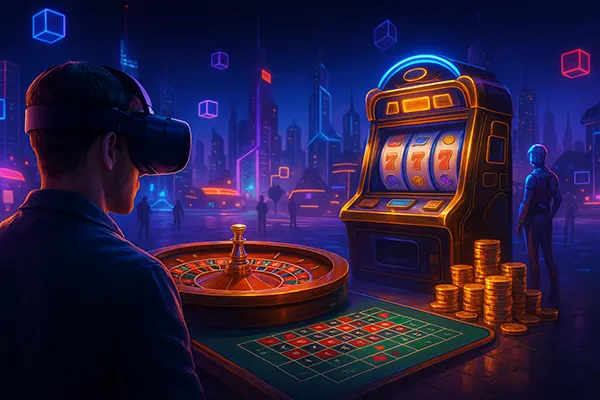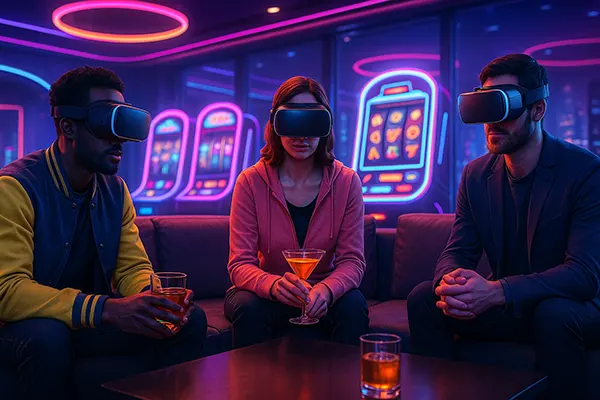
Meta-Gaming and the Metaverse: The Integration of Crypto Casinos into Virtual Worlds
The rapid evolution of Web3 technologies, virtual reality (VR), augmented reality (AR), and blockchain has paved the way for a new chapter in digital entertainment. Among the most fascinating trends is the rise of crypto casinos inside metaverse ecosystems. Virtual environments such as Decentraland and The Sandbox have transformed from experimental projects into bustling digital arenas where gaming, finance, and social interaction converge. For players, this creates opportunities to engage with gambling in a way that is more immersive, transparent, and community-driven than ever before.
Metaverse as a New Arena for iGaming
Metaverses are not merely digital spaces for socialising or exploring virtual art galleries; they are increasingly becoming hubs of interactive entertainment. Crypto casinos have emerged within these ecosystems, offering players a chance to step into fully realised virtual venues where slot machines, roulette tables, and poker rooms exist in three-dimensional environments. The difference lies in how these experiences blend the realism of traditional casinos with the innovative features of blockchain technology.
In 2025, Decentraland and The Sandbox are leading examples of metaverse projects integrating iGaming. Players can use avatars to navigate through digital landscapes, enter casinos, and participate in games without geographical restrictions. These casinos often rely on cryptocurrencies like Ethereum, Bitcoin, or stablecoins for deposits and winnings, ensuring faster transactions and greater financial transparency.
Unlike standard online gaming environments, metaverse-based casinos allow users to socialise, collaborate, and compete in ways that closely resemble real-world gatherings. This creates a new layer of social presence and engagement that traditional websites or mobile apps cannot fully replicate.
The Role of VR and AR in Enhancing Gameplay
Virtual and augmented reality technologies play a central role in shaping how players interact with crypto casinos in the metaverse. By wearing VR headsets, users can experience authentic casino atmospheres, from detailed table layouts to dynamic soundscapes. AR adds another dimension by overlaying digital casino elements onto real-world surroundings, making gambling experiences more personal and accessible.
These technologies not only improve immersion but also create stronger emotional connections with games. For example, VR-enabled poker games allow participants to read opponents’ gestures and body language, simulating the psychological aspects of in-person gambling. Such innovations transform digital betting into a more complex, strategic, and socially engaging activity.
As hardware becomes more affordable and software more sophisticated, VR and AR adoption is expected to expand, making metaverse casinos a mainstream alternative to traditional online gambling by 2030.
Integration of Blockchain and NFTs
Blockchain provides the technological backbone that enables crypto casinos to operate in decentralised environments. Smart contracts ensure that wagers, payouts, and odds are executed transparently and without intermediaries. This reduces the potential for manipulation and strengthens trust among players who demand fairness in iGaming.
NFTs (non-fungible tokens) add another layer of innovation. Within metaverse casinos, NFTs may represent unique items such as exclusive skins for avatars, VIP access passes, or even ownership of digital gaming tables. These assets can be traded or sold in decentralised marketplaces, creating an economy that extends beyond the gambling floor itself.
The ability to own and monetise virtual assets gives players a sense of participation in the growth of these ecosystems. In some cases, communities vote on casino governance decisions using decentralised autonomous organisations (DAOs), further reinforcing the idea of user-driven gaming environments.
Security and Transparency in Crypto Casinos
One of the major advantages of blockchain integration is the security it provides. Transactions are recorded on public ledgers, reducing the risk of fraud or hidden manipulations. For players, this translates into an assurance that payouts and odds are not only guaranteed but verifiable by anyone with access to the blockchain.
Furthermore, the decentralised nature of these casinos allows users to retain more control over their funds. Rather than relying on centralised operators, players connect their wallets directly to gaming environments, making withdrawals and deposits seamless and efficient.
This transparency, combined with the immutability of blockchain records, builds confidence among users and sets a new standard for accountability in the gambling industry.

The Future of Crypto Casinos in the Metaverse
As 2025 unfolds, the integration of crypto casinos into metaverses signals a broader shift towards decentralised entertainment ecosystems. These environments do not only host games but also foster communities where players can connect, invest, and participate in shared experiences that stretch beyond gambling itself.
Regulation will play a pivotal role in shaping this future. Countries such as Malta and jurisdictions under the MGA (Malta Gaming Authority) are actively exploring frameworks to oversee blockchain-based gambling. Ensuring compliance with responsible gambling standards, data protection, and financial transparency will determine how quickly these innovations achieve mainstream adoption.
At the same time, metaverse casinos represent an opportunity for collaboration between gaming developers, blockchain engineers, and regulators. By working together, they can create secure, entertaining, and sustainable ecosystems that reflect the needs of a global audience.
Opportunities and Challenges Ahead
The opportunities for growth in crypto casinos within metaverses are vast. Increased adoption of VR headsets, mainstream cryptocurrency usage, and stronger regulatory frameworks will accelerate development. Partnerships with major gaming studios could further enhance content diversity and attract broader demographics.
However, challenges remain. Legal uncertainty across jurisdictions, risks of addiction in immersive environments, and the environmental impact of blockchain technologies are pressing issues. Addressing these challenges requires coordinated action and the implementation of responsible gaming practices tailored to immersive virtual worlds.
Ultimately, crypto casinos in the metaverse are not just another form of online gaming but a step towards redefining how people interact with digital economies, entertainment, and communities in the Web3 era.
Similar articles
-
 Deposit and withdrawals via L2 / Lightning: whe...
Deposit and withdrawals via L2 / Lightning: whe...By 2026, second-layer crypto infrastructure has matured significantly, yet the …
-
 Gamdom: a crypto casino look at “boosted RTP” —...
Gamdom: a crypto casino look at “boosted RTP” —...“Boosted RTP” sounds simple: a higher return-to-player percentage on certain …
-
 What Real Anonymity in Cryptocurrencies Means i...
What Real Anonymity in Cryptocurrencies Means i...People often say they want “anonymous crypto”, but in 2026 …
-
 How to Prepare a Cryptocurrency Portfolio for P...
How to Prepare a Cryptocurrency Portfolio for P...The European Union is entering a decisive phase in the …
